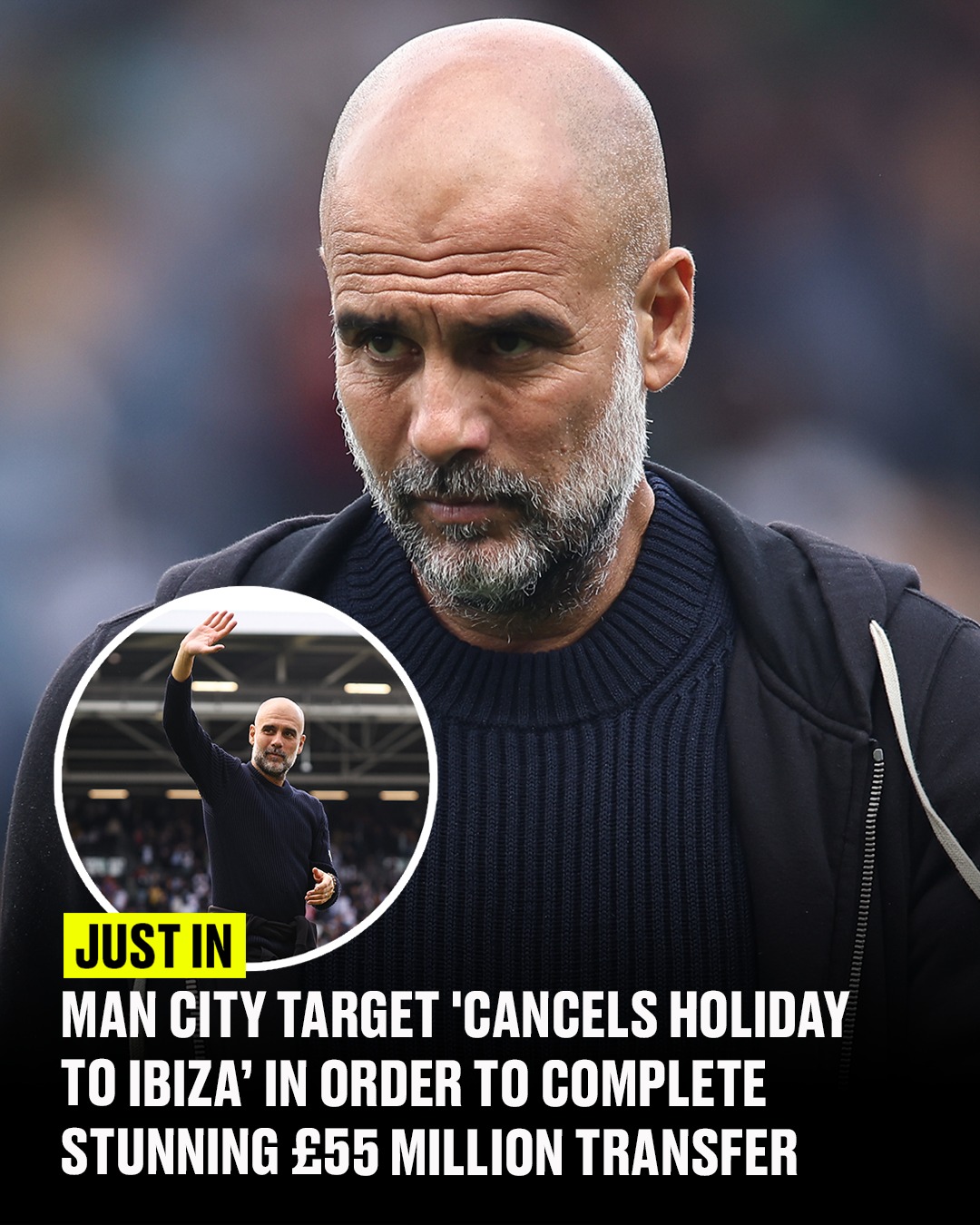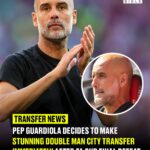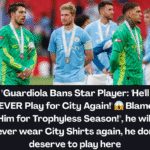Man City target ‘cancels holiday’ to complete stunning £55 million transfer

Manchester City’s 2024-25 season has been a tale of unexpected disappointment and mounting pressure, culminating in a shocking FA Cup final defeat that has accelerated the club’s summer transfer plans. As the dust settles on what many consider one of Pep Guardiola’s most challenging campaigns at the Etihad Stadium, the Catalan manager and the club’s hierarchy are already orchestrating what promises to be a transformative summer window.
The Wake-Up Call: FA Cup Final Heartbreak
Saturday afternoon at Wembley Stadium delivered a seismic shock that reverberated through the corridors of Manchester City. Crystal Palace, a club that had waited 164 years for their first major trophy, produced the performance of their lives to secure a historic 1-0 victory over the heavily favored Citizens. Eberechi Eze’s solitary strike not only handed Oliver Glasner’s side their maiden major silverware but also condemned Manchester City to their first trophyless season since 2016-17.
The defeat represented more than just a single match disappointment; it symbolized the end of an era of dominance that had seen City claim four Premier League titles in five years. For a club accustomed to collecting silverware with metronomic regularity, the barren campaign has served as a stark reminder that even the most successful teams can face periods of transition and challenge.
The immediate aftermath of the Wembley defeat saw Guardiola’s demeanor shift from his usual animated touchline presence to a more contemplative figure. Sources close to the club suggest that the Spanish tactician spent the hours following the final loss in deep discussion with director of football Hugo Viana, mapping out the extensive rebuild required to restore City to their former glory.
The Broader Context: A Season of Unmet Expectations
To understand the urgency behind City’s summer transfer strategy, one must examine the broader context of their 2024-25 campaign. Finishing third in the Premier League represented a significant drop from their usual title-challenging positions, with the gap to the champions highlighting the work required to bridge back to the summit of English football.
The season’s disappointments extended beyond domestic competition. Early exits from both the Champions League and Carabao Cup further emphasized the need for squad renewal. For only the second time in Guardiola’s tenure, the trophy cabinet remained empty, creating an atmosphere of expectation and pressure that has rarely been felt at the Etihad in recent years.
Statistical analysis of the season reveals telling insights into where City’s campaign faltered. Goals scored dropped by 15% compared to the previous season, while defensive solidity – once a hallmark of Guardiola’s teams – showed signs of vulnerability with 12 more goals conceded than in their title-winning campaigns. The midfield, traditionally the engine room of City’s possession-based approach, lacked the dynamism and creativity that had become synonymous with the club’s playing style.
The January Window: A Sign of Things to Come
City’s hierarchy didn’t wait for the summer to begin addressing their squad deficiencies. The January transfer window saw an unprecedented £180 million investment in four new recruits, demonstrating the club’s commitment to immediate improvement. This substantial outlay represented more than just squad strengthening; it signaled a recognition that the existing group required significant reinforcement to maintain their competitive edge.
The winter signings, while addressing immediate needs, were viewed internally as merely the first phase of a more comprehensive rebuild. Sources within the club suggest that the January acquisitions were always intended as the foundation for a more extensive summer overhaul, with the recruitment team already identifying key targets for the upcoming window.
Enter Hugo Viana: The New Architect
The appointment of Hugo Viana as director of football has injected fresh perspective into City’s transfer strategy. The Portuguese executive, renowned for his astute recruitment during his tenure at Sporting CP, brings a different philosophical approach to player identification and acquisition. His influence on the club’s summer plans cannot be overstated, with many of the current targets reflecting his preference for technically gifted players who can adapt to multiple roles within Guardiola’s system.
Viana’s network of contacts across European football has already proven invaluable in identifying potential signings. His relationships with agents, clubs, and players have opened doors that might otherwise have remained closed, particularly in the competitive market for elite talent. The Portuguese executive’s reputation for identifying undervalued assets while also securing marquee signings has given City confidence in their ability to compete for the summer’s top targets.
The Tijjani Reijnders Saga: A Transfer in Motion
At the center of City’s summer transfer plans sits AC Milan midfielder Tijjani Reijnders, a player whose potential arrival has captured the imagination of the club’s supporters and tactical analysts alike. The 26-year-old Netherlands international represents the type of versatile, technically proficient midfielder that Guardiola has built his most successful teams around.
Reijnders’ decision to cancel a family holiday to Ibiza, originally scheduled for early July, has sent ripples through the transfer rumor mill. The gesture, while seemingly small, represents a significant indicator of the player’s desire to complete a move to the Etihad Stadium. In the high-stakes world of football transfers, such actions often prove pivotal in determining whether deals reach completion.
The £55 million valuation placed on Reijnders reflects both his current ability and future potential. Having scored 15 goals in all competitions for Milan during the 2024-25 season, the midfielder demonstrated an attacking threat that would add a new dimension to City’s midfield options. His ability to operate in multiple positions – from deep-lying playmaker to attacking midfielder – aligns perfectly with Guardiola’s tactical preferences for positional fluidity.
Tactical Analysis: How Reijnders Fits the System
From a tactical perspective, Reijnders’ potential arrival would address several key areas where City struggled during the past season. His press-resistant qualities and ability to progress the ball through tight spaces would restore the midfield control that had been somewhat lacking. The Dutchman’s goal-scoring threat from midfield positions would also provide additional attacking options, reducing the burden on the forward line.
Guardiola’s system demands midfielders who can seamlessly transition between defensive and attacking phases of play. Reijnders’ experience in Serie A, where tactical discipline is paramount, has prepared him well for the demands of playing in a Guardiola team. His ability to maintain possession under pressure while also providing incisive forward passes makes him an ideal candidate for the false nine role that has become increasingly important in City’s tactical setup.
The midfielder’s international experience with the Netherlands has also exposed him to different tactical systems and playing styles, providing the versatility that Guardiola values in his squad members. His performances in major tournaments have demonstrated his ability to perform under pressure, a quality that will be essential in City’s quest to return to the pinnacle of European football.
The Wider Transfer Strategy: Beyond Reijnders
While Reijnders represents the most advanced pursuit, City’s summer transfer strategy extends far beyond the Milan midfielder. Nottingham Forest’s Morgan Gibbs-White has emerged as another primary target, with the England international’s creativity and pace offering different qualities to the midfield rebuild. The 25-year-old’s ability to operate across the front line as well as in central midfield positions provides the tactical flexibility that Guardiola demands.
Gibbs-White’s breakthrough season with Forest, where he established himself as one of the Premier League’s most creative players, has attracted attention from several top clubs. City’s interest reflects their desire to add homegrown talent to their squad while also addressing the creativity deficit that became apparent during the past season. The player’s relatively young age also aligns with the club’s strategy of building for both immediate success and long-term sustainability.
Defensively, Wolves full-back Rayan Ait-Nouri has been identified as a potential solution to City’s left-back concerns. The French defender’s pace and attacking threat down the flank would provide the width that has been crucial to City’s success in previous seasons. His ability to contribute both defensively and offensively makes him an attractive option for Guardiola’s system, which demands full-backs who can effectively operate as auxiliary midfielders when in possession.
The Club World Cup Factor: A Unique Opportunity
The timing of City’s transfer activity has been influenced by their participation in the revamped FIFA Club World Cup tournament in the United States. The competition, taking place in June and July, has created a unique situation where clubs can register new players during a special transfer window running from June 1-10. This abbreviated window adds urgency to City’s pursuit of their targets, as they seek to strengthen their squad before the tournament begins.
The Club World Cup represents more than just another competition for City; it provides an opportunity to restore their winning mentality and build momentum for the 2025-26 season. The tournament’s global audience and prestigious nature make it an ideal platform for new signings to announce themselves on the world stage. The competition also offers Guardiola valuable time to integrate new players into his tactical system before the domestic season begins.
City’s opening fixtures in the tournament – against Wydad AC of Morocco on June 18, followed by matches against Al Ain and Juventus – provide a challenging test that will reveal the effectiveness of their summer recruitment. The variety of opponents, from different continents and playing styles, will offer comprehensive preparation for the challenges that await in the upcoming season.
Financial Considerations and Fair Play
The scale of City’s planned investment has raised questions about Financial Fair Play compliance, particularly following their substantial January outlay. However, the club’s commercial revenues and player sales are expected to provide sufficient room for maneuvering within the regulations. The potential departure of several squad members, combined with the increased revenue from their Club World Cup participation, should create the financial flexibility required for their ambitious transfer plans.
The club’s approach to transfer fees has evolved under Viana’s influence, with a greater emphasis on structured deals that spread costs over multiple years. This strategy allows for larger initial investments while maintaining compliance with financial regulations. The Portuguese executive’s experience in navigating complex transfer negotiations has proven invaluable in structuring deals that satisfy all parties involved.
The Broader Implications: A Statement of Intent
City’s aggressive pursuit of multiple high-profile targets represents more than just squad strengthening; it constitutes a statement of intent to their domestic and European rivals. The club’s willingness to invest heavily following a disappointing season demonstrates their commitment to maintaining their position among the global elite. This approach reflects the ownership’s long-term vision for the club and their refusal to accept mediocrity.
The psychological impact of such significant investment cannot be underestimated. For existing squad members, the arrival of high-quality players raises the competitive standard and demands improved performances. For potential opponents, City’s summer activity serves as a warning that the club intends to return to their dominant best with renewed vigor and enhanced quality.
Looking Ahead: The 2025-26 Season and Beyond
As City’s transfer activity intensifies, attention naturally turns to the upcoming season and the challenges that await. The Premier League’s competitiveness continues to increase, with rivals also strengthening their squads during the summer window. City’s ability to integrate new signings quickly and effectively will be crucial in determining their success in the campaign ahead.
Guardiola’s track record of maximizing player potential provides confidence that new arrivals will adapt quickly to his demanding system. The Spanish coach’s ability to identify and develop specific skills in players has been a hallmark of his tenure at City, and the summer signings will undoubtedly benefit from his tactical expertise and attention to detail.
The club’s long-term planning extends beyond the immediate future, with sustainability and continuous improvement remaining core objectives. The summer transfer activity represents part of a broader strategy to ensure City remains competitive at the highest level for years to come. The combination of experienced additions and emerging talent should provide the balance necessary for sustained success across multiple competitions.
Conclusion: A Pivotal Summer
Manchester City’s summer transfer window represents a pivotal moment in the club’s recent history. The combination of FA Cup final disappointment, the need for squad renewal, and the opportunity provided by the Club World Cup has created the perfect storm for significant investment and change. The pursuit of Tijjani Reijnders, alongside other targets, demonstrates the club’s commitment to returning to the pinnacle of English and European football.
The success of City’s summer business will ultimately be measured not just in the quality of individual signings, but in how effectively they integrate into Guardiola’s tactical system and contribute to the team’s collective success. The stakes are high, the investment substantial, and the expectations enormous. For Manchester City, the summer of 2025 represents nothing less than the foundation for their next era of dominance.
As the transfer window progresses and deals move toward completion, one thing remains certain: Manchester City’s response to their disappointing season will be bold, ambitious, and designed to send a clear message to the footballing world that their period of transition is merely the prelude to renewed success. The £55 million pursuit of Reijnders and the broader summer strategy represent the first steps in what promises to be a fascinating journey back to the summit of world football.















